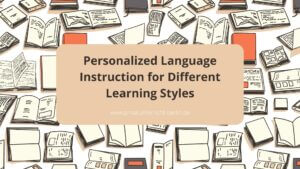Your Language Journey, Your Way: Start with a Private Tutor

Boosting Fluency With Conversation Practice And Your Language Guide
Welcome to the world of language fluency! Communicating in a foreign language opens up new opportunities and broadens your understanding of different cultures.
However, mastering a language can be intimidating, especially when it comes to speaking skills. But fear not – with the proper guidance and practice, you too can boost your fluency through conversation.
At first, speaking in a foreign language may seem daunting. You may need more vocabulary or will make mistakes. The good news is that these hurdles are easily overcome with regular conversation practice and support from your language guide.
In this article, we’ll explore how incorporating conversation practice into your learning routine alongside utilizing a language guide will help build confidence and improve your fluency over time. So let’s dive in!
Table of Contents
Overcoming Speaking Anxiety
Did you know that according to a study conducted by the National Institute of Mental Health, about 75% of people experience some level of speaking anxiety when it comes to public speaking or conversing in a foreign language?
This statistic highlights how common it is for language learners to feel nervous or self-conscious when practicing their conversation skills. However, overcoming this anxiety is crucial for improving fluency and building confidence in communicating effectively.
One helpful technique for reducing speaking anxiety is role-playing exercises. You can safely practice using new vocabulary and grammar structures by simulating real-life conversations with a partner or language guide.
Role-playing also allows you to experiment with different social situations and learn how to navigate them appropriately. Visualization techniques are another effective way to ease speaking anxiety. Before engaging in conversation practice, visualize yourself confidently communicating with others in your target language.
This mental preparation can help alleviate nerves and increase overall fluency during conversations.
Building Vocabulary Through Conversation
Conversation practice is an excellent way to improve your vocabulary skills. Engaging in conversations with others helps you gain confidence and provides opportunities to learn new words and phrases that may be useful in various contexts. It’s essential, however, to remember that building vocabulary takes time and effort.
Here are some tips on how to build your vocabulary through conversation:
- Word association: Start with a word and ask your partner to say the first word that comes to their mind. This activity can help expand your vocabulary by encouraging you to think of different words related to a topic.
- Storytelling prompts: Use storytelling prompts such as ‘Tell me about a time when…’ or ‘If you could travel anywhere in the world, where would you go?’ These prompts encourage discussion and allow you to use more descriptive language.
Remember, building your vocabulary requires consistency and repetition. Incorporating these activities into your daily routine will allow you to practice regularly and increase the number of words at your disposal.
As you continue to work on improving fluency through conversation, it’s essential to have resources available for support. A language guide can be an invaluable tool in helping you navigate grammar rules, idioms, pronunciation, and other aspects of language learning. With access to a reliable language guide, you’ll feel confident knowing there’s always someone or something available if questions arise during practice sessions.
Utilizing A Language Guide For Support
When improving your language fluency, utilizing a language guide can be beneficial. Language guides provide support and guidance with interactive exercises that allow you to practice your speaking skills in a safe and supportive environment. They also help you become more aware of cultural nuances affecting communication with others.
Interactive exercises are a vital component of using a language guide for support. These exercises allow you to apply what you’ve learned in real-life situations, helping you build confidence and improve your communication ability. Additionally, by working through these exercises with a language guide, you’ll receive personalized feedback on areas where you need improvement, ultimately leading to faster progress in your language learning journey.
Cultural nuances are another critical aspect of using a language guide for support. Understanding cultural differences is essential when communicating with people from different backgrounds or countries. A language guide can help identify some of these differences and teach you how to navigate them successfully. By doing so, you will be able to communicate more effectively and gain insights into other cultures that can enrich your life personally and professionally.
As we continue our discussion about boosting fluency with conversation practice, let’s focus on structuring practical conversation practice sessions that can further enhance your progress.
Structuring Effective Conversation Practice
As we discussed in the previous section, having a language guide can be incredibly helpful in improving your fluency. However, conversation practice is essential for becoming comfortable speaking and understanding your target language.
Here are some tips on how to structure effective conversation practice:
- Start with pronunciation drills: Before diving into entire conversations, focusing on perfecting your pronunciation of keywords and phrases is essential. This will allow you to communicate more clearly and effectively from the start.
- Incorporate role-playing scenarios: Role-playing exercises help simulate real-life situations you may encounter while using your target language. These scenarios also provide an opportunity to practice new vocabulary and sentence structures in context.
- Set specific goals for each session: Whether mastering a particular grammar rule or increasing your speed at responding to questions, setting clear objectives for each conversation practice session will help keep you motivated and focused.
By following these suggestions, you’ll be well on your way to boosting your confidence in speaking and comprehending another language.
As you continue practicing conversation skills regularly, tracking progress and measuring success becomes crucial. In the next section, we’ll explore ways to monitor improvement over time so that you can see just how far you’ve come in achieving fluency in your target language.
Tracking Progress And Measuring Success
As you continue to practice your conversational skills with the help of a language guide, it’s essential to track your progress and measure your success. Goal setting is crucial in any learning process because it provides direction for what you want to achieve. Take some time at the beginning of each week or month to set realistic goals for yourself. For example, if you struggle with vocabulary, aim to learn ten new words every week. By having specific objectives in mind, you’ll be more motivated and focused during your language practice sessions.
Self-reflection is another critical component of tracking progress and measuring success. After each session, take a moment to think about what went well and what could have been better. Did you successfully use a newly learned phrase in conversation? Were there times when you struggled to understand native speakers? Write down these observations so that you can revisit them later on. Reflecting on successes and areas for improvement will allow you to adjust your approach accordingly and continuously improve upon your fluency.
| Goals | Progress | Reflections |
|---|---|---|
| Learn 10 new words per week | Week 1 – Learned 8 words; | |
| Week 2 – Learned 12 words | Struggled with remembering new vocabulary during conversations | |
| Use idiomatic expressions correctly in conversation | Successfully used an idiom during a coffee chat with a coworker | Need more exposure to different contexts where phrases are commonly used |
| Practice listening comprehension daily | Completed daily exercises from the language app for one week straight | Noticed improvements in understanding spoken Spanish |
Remember that language learning is not always linear – setbacks and plateaus are standard process parts. With proper goal-setting and self-reflection techniques, however, you’ll be able to stay accountable while celebrating your progress along the way. Keep up the excellent work!
Frequently Asked Questions
How Can I Improve My Writing Skills Alongside My Conversation Practice?
Improving writing skills alongside conversation practice is a crucial aspect of language fluency.
Journaling exercises can effectively advance your writing ability, allowing you to express thoughts and ideas in written form. This exercise helps develop the skill of organizing one’s thoughts coherently while practicing grammar rules and sentence structure.
Additionally, vocabulary quizzes are another way to enhance writing proficiency by expanding one’s lexicon and improving word choice in sentences. These exercises help learners write more descriptive texts that convey their intended meaning effectively.
Therefore, incorporating journaling exercises and vocabulary quizzes into your language learning routine can be beneficial for simultaneously honing both speaking and writing skills.
Can I Practice Multiple Languages At The Same Time?
Multitasking languages is a challenging task that requires balancing focus, time management, and progress tracking. Setting goals and priorities is crucial to stay consistent in practicing multiple languages.
To achieve fluency, it is essential to maintain motivation by finding engaging ways to learn and practice regularly. As language fluency experts recommend, focusing on one language at a time is better to avoid confusion and ensure effective learning.
However, if you decide to pursue multitasking languages, creating a schedule and sticking to it can help track your progress while ensuring consistency in your learning journey.
Is It Necessary To Have A Language Partner, Or Can I Practice Alone?
To answer this question, having a language partner to improve fluency is optional. Solo practice benefits include allowing you to focus on your own progress and tailor exercises specifically for your learning style.
However, finding language exchange events can be a great way to supplement solo practice and gain valuable conversation experience with native speakers.
As a language fluency expert, I recommend incorporating solo practice and social interaction into your language learning routine for optimal results.
Remember, consistency is key!
How Can I Find Conversation Partners Who Share Similar Interests?
Looking for conversation partners with similar interests can be a great way to boost your language fluency, especially when discussing travel-based topics.
To find these partners in your local community, try attending social events or joining clubs and groups that align with your passions. You can also use online resources such as Meetup.com or language exchange apps like HelloTalk to connect with others interested in practicing their language skills.
Remember, the key is to actively engage in conversations and immerse yourself in the language as much as possible. Don’t be afraid to make mistakes; always strive to improve through consistent practice and exposure.
What Are Some Effective Ways To Incorporate Grammar Practice Into Conversation Sessions?
Effective ways to incorporate grammar practice into conversation sessions include role-playing scenarios and using news articles.
As a language fluency expert, I recommend utilizing these techniques in your daily conversational practice to enhance your speaking skills and improve grammatical accuracy.
Role-playing allows you to simulate real-life situations and apply the appropriate grammar rules accordingly.
Meanwhile, reading news articles allows you to analyze complex sentences and learn new vocabulary words in context.
By incorporating both strategies into your conversation sessions, you can boost your fluency and achieve more excellent proficiency in the target language.
Conclusion
In conclusion, improving your language fluency takes practice and dedication. By incorporating conversation practice into your daily routine and utilizing a language guide, you can boost your writing skills and become more confident speaking the language.
Imagine yourself effortlessly conversing with someone from another country, discussing shared interests, and learning about their culture. This dream can become a reality with the help of a language partner or group.
Practice different languages simultaneously to expand your linguistic abilities even further.
As a language fluency expert, please utilize all available resources. Don’t be afraid to make mistakes; they are essential to the learning process. Incorporate grammar exercises into your conversations for maximum effectiveness.
Remember that consistent practice is crucial in achieving fluency in any language. So start practicing today and watch as your language skills flourish!



